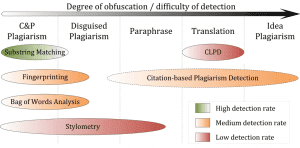5 Things to Remember About Plagiarism After Graduation
Some skills will serve you well outside of school...
 Graduation season is upon us. All across the U.S., and much of the world, students are graduating from school and transitioning either to a different part of their education or to the workforce.
Graduation season is upon us. All across the U.S., and much of the world, students are graduating from school and transitioning either to a different part of their education or to the workforce.
But for the students who are completing their formal education, it’s a time to put a lot of things behind them.
Among those things are early morning lectures, meal plans, summer breaks and, of course, thinking about plagiarism.
However, the latter is simply not true. While you can likely forget all about MLA and APA styles once you leave school (unless you move into a field that requires it), as long as you create, plagiarism will be a consideration.
To that end, college isn’t always the best preparation for the plagiarism issues to come, but there are several things that you should definitely remember about plagiarism after graduation.
On that note, here are just five things you should definitely remember about plagiarism after your graduation.
1: The Basics of What Plagiarism Is
 Most schools, when writing about plagiarism in their honor codes, don’t write about it in terms specific to academia. They use broad strokes to describe it. Look at the honor code for my alma mater, the University of South Carolina:
Most schools, when writing about plagiarism in their honor codes, don’t write about it in terms specific to academia. They use broad strokes to describe it. Look at the honor code for my alma mater, the University of South Carolina:
Plagiarism: Unauthorized use of another person’s work without proper acknowledgment of source.
Examples: copying and pasting information as if it were your own work, not citing quotes or materials, poor paraphrasing, not citing after paraphrasing, utilizing another student’s paper and turning it in as your own, etc.
The definition and the examples work just as well outside of academia as they do inside. Though the examples make mention of using another student’s paper, you could say another “person’s work” and it would apply in pretty much equally outside of the school.
While some of the specific rules of how to avoid plagiarism are unique to academia, the broad strokes about what plagiarism is remain perfectly valid inside and outside of school, making it a lesson well worth holding onto.
2: How to Avoid Plagiarism
 Ideally, your time in school taught you a great deal about writing. Writing is one of the primary ways schools test your knowledge making it a critical skill to learn and use while in the classroom.
Ideally, your time in school taught you a great deal about writing. Writing is one of the primary ways schools test your knowledge making it a critical skill to learn and use while in the classroom.
One of the skills that should have been learned it how to incorporate others’ work into your writing. Techniques such as writing in a cleanroom should stick with you for the rest of your working life.
Also, techniques to improve note management and writing organization can go great lengths to ensuring that no uncited text ends up in your work.
Avoiding plagiarism is no accident. The techniques you learned in school will serve you anywhere you go, no matter what you write. Don’t forget them and keep using them.
3: How (and When) to Talk About Plagiarism
 One thing academia does very well when it comes to plagiarism is get people to talk about it. Students, often fearing punishment, are regularly discussing what is and is not plagiarism, how they can avoid it and so forth.
One thing academia does very well when it comes to plagiarism is get people to talk about it. Students, often fearing punishment, are regularly discussing what is and is not plagiarism, how they can avoid it and so forth.
While they don’t always pull away the best lessons and don’t always talk to the correct people (Talk with your instructors about their expectations, not your peers), talk about it they do.
However, it’s far too often that conversation stops when students leave academia and that is a tremendous shame.
Different positions, industries, projects, fields, etc. have different standards of attribution and citation. Many of those have attribution and citation standards very different from academia and it might be confusing working within them if you’re new to that particular type of work.
Learning how to talk about plagiarism and citation is a valuable skill that academia can teach you. Keep talking about it, discuss it with those in your field and work to ensure that you don’t make mistakes that can hurt your career.
After all, the dangers of plagiarizing outside of academia are just as great. Instead of degree, you could lose your career.
4: How to Check for Plagiarism
 Checking for plagiarism is a skill that many pick up to some degree in school. Learning how to use a plagiarism checker, read the results and how to determine what is and is not problematic text is a skill that can help later on as well.
Checking for plagiarism is a skill that many pick up to some degree in school. Learning how to use a plagiarism checker, read the results and how to determine what is and is not problematic text is a skill that can help later on as well.
The simple reason is this: Pretty much no matter what you do with your life after school, you’re going to have to write. Being able to confirm that your writing is without plagiarism is always a useful skill.
It may not be as commonly used of a skill outside of school as it is within, but it’s still useful. If nothing else, it’s a way to confirm or deny your hunches about other people’s writing.
This is one of those skills you probably won’t need a lot, but when and if you do, you’ll be glad you have it.
5: How to Deal with Plagiarism
 Finally, this lesson isn’t taught to the student directly, but rather, is an example of teaching through example.
Finally, this lesson isn’t taught to the student directly, but rather, is an example of teaching through example.
Schools, on the whole, have policies in place for dealing with plagiarism (as well as other ethical infractions). These policies have clearly-defined processes for determining what happened, means for providing some sort of trial, an appeal system and clearly-defined punishments.
It’s a lot of work, but that work is invaluable when it comes to dealing with ethical infractions.
Basically, far too many places, including newspapers and other publishers, are caught flatfooted by plagiarism. If you have a place that creates content, especially for public distribution, you need to have a policy now for dealing with plagiarism. This includes checking for plagiarism and handling it after it is discovered.
Simply taking a lesson from your school could save you a great deal of headache in the world outside of academia.
Bottom Line
When you get your degree/diploma and leave academia behind, there’s a lot of things you can probably forget. I only use a small percentage of what I learned in school and my experience is far from unique.
However, as long as you write and create, plagiarism is still an issue to consider. It may not be the most important issue for you or something that comes up on a daily basis, however, it’s still something you need to be aware of.
Whether your writing memos for your office, briefs for the court or articles for a website, being conscious of plagiarism and what is expected of you can help keep you out of trouble.
After all, being an ethical writer is just part of being a good writer and that’s true of any creative field.
So, when you throw your cap, be sure to retain some of your knowledge of plagiarism. It might serve you well in the future.
Want to Reuse or Republish this Content?
If you want to feature this article in your site, classroom or elsewhere, just let us know! We usually grant permission within 24 hours.
